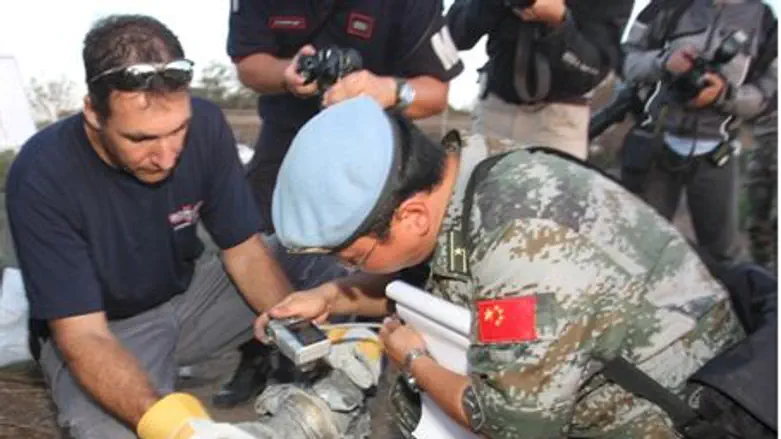
Syrian rebels on Thursday briefly seized the only crossing along the Israel-Syria ceasefire line on the Golan, before regime forces recaptured it using tanks, an AFP correspondent and Israeli sources said.
A security source told AFP that Israel is worried by the latest developments on the border, which could lead to a situation in which Israel faces Hizbullah on the Syrian front as well as the Lebanese one.
The fighting took place at the Quneitra crossing and the nearby village of the same name in the demilitarized zone between the Israeli and Syrian parts of the strategic plateau.
The clashes were very close to the headquarters of a UN peacekeeping force, prompting Austria to announce it was withdrawing its troops from the mission.
"The Syrian army has recovered control of the crossing," an Israeli security source told AFP, speaking on condition of anonymity.
An AFP correspondent near the crossing also confirmed that forces loyal to President Bashar al-Assad had retaken Quneitra, saying he could see regime tanks moving inside the area.
Quneitra is the only crossing point between Syria and the Israeli side of the Golan Heights which the Jewish state liberated during the 1967 Six-Day War.
The Israeli military earlier confirmed that the crossing and the nearby town of the same name had fallen into rebel hands.
"We can confirm that opposition forces have overrun the town of Quneitra and the border post," said Captain Arye Shalicar.
The Syrian Observatory for Human Rights, a Britain-based group that monitors Syria's two-year conflict, had also confirmed the takeover.
Following the clashes, in which two UN peacekeepers were slightly injured, Austria announced it was withdrawing its 380 troops from the UN Disengagement Observer Force (UNDOF) which has been monitoring the ceasefire line since 1974.
"The Austrian army's participation in the UNDOF mission can no longer be maintained for military reasons," an official statement said, indicating the threat to its soldiers had "reached an unacceptable level."
The pullout will have a significant impact on the size of the UN peacekeeping force, whose numbers dropped to around 900 in March after Croatia became the latest country to withdraw its soldiers, following similar moves by Canada and Japan.
There was no immediate reaction from Israel which has long feared that the violence could force UNDOF to completely pull out, leaving the ceasefire zone open to infiltration by hardline militants.
"It is very worrying because on the one hand you have jihadists and Islamists who are fighting there (with the rebels), and on the other hand, you also have government forces which are allied with Hizbullah," said a security source of the Lebanese militia which has allied itself with Assad's regime.
"We certainly don't want to have Hizbullah on two fronts," he said.
Until now, Israel had no information suggesting Hizbullah forces were operating in the area, he added.
But the army spokesman said they were watching the situation "very closely".
“We have to be ready for any development," Shalicar told AFP.
The flareup prompted Israel to reinforce its military presence on the plateau, Israel's public radio said.
Although the army refused to confirm the report, AFP correspondents reported seeing tanks on flatbed trucks in the Quneitra area.
And Israel also lodged a formal complaint with UNDOF over the entry of regime tanks into the demilitarized zone as they moved to retake Quneitra.
"A formal complaint was conveyed by the Israeli army to UNDOF regarding the entrance of tanks to the non-military zone near Quneitra," a spokeswoman said.
Also on Thursday, the army said three mortar rounds struck the central Golan Heights, causing no damage or injuries.
And during the morning, two badly wounded Syrians were let in through Quneitra and taken to Ziv hospital in the Galilee town of Safed.
It was not clear whether they were rebels, government troops or civilians, but Ziv hospital said that a "live hand grenade" had been found on one of them, sparking a brief security scare.
"The grenade was found as doctors treated a seriously wounded and unconscious person," a hospital statement said.
"When they began removing his clothes they found the live grenade in his pocket."
The area of the trauma room and the operating theater were both evacuated but the grenade was quickly defused by bomb disposal experts, it said.
Syria remains formally at war with Israel and Quneitra crossing is used almost exclusively by Druze residents from the Israeli side who are allowed to cross over to study, work or get married.
Israel controls some 1,200 square kilometers (460 sq miles) of the strategic plateau, while around 510 square kilometers remain in Syrian hands.